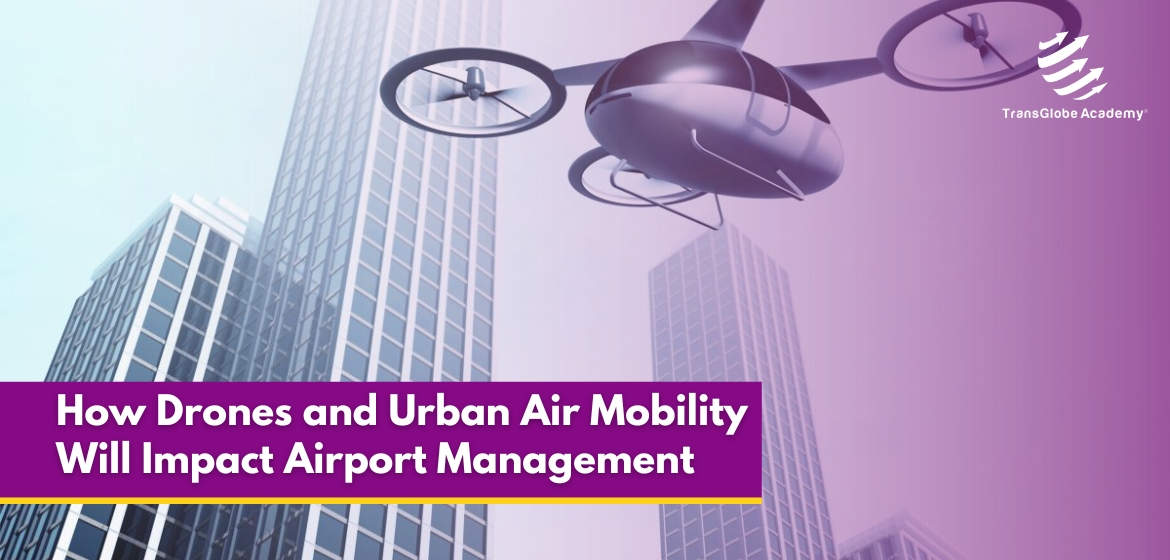The skies above us are changing rapidly. For a long time, airports focused on big aircraft. Soon, small flying machines – drones – and a new concept, Urban Air Mobility (UAM), will change airport operations as we know it. If you are considering a career in this exciting area, especially by studying airport management courses in Kerala, it is important to understand these changing dynamics.
Drones have moved from toys to sophisticated tools. They can accomplish a diverse range of activities, including inspections, surveillance, deliveries, and mapping. For airports, this introduces some incredible opportunities and challenges.
The Drone Effect: Making Things Better and Safer
Imagine checking runways, which used to take hours and lots of people to do, now occurring in seconds and perfectly via smart drones. This is already starting to happen. Drones with good cameras and heat sensing can quickly locate issues like cracks, trash or animals on runways. This allows issues to be identified faster and improves safety. Also, searching vast airport perimeters for security issues, or monitoring construction can be done more easily and cost-effectively. This way of doing maintenance and security before problems happen will definitely be a key part of future airport management courses in Ernakulam.
Drones can also play an important role in the event of an emergency, they can show live overhead views of the scene to the rescue teams, so they can see the situations when determining how to provide assistance. This sort of greater situational awareness is a big advantage for crisis management at an airport.
Managing the Challenges of Integrating Drones and Regulations
Having more drones brings challenges on top of rules and procedures. Drones flying unsafely near airports can result in several dangerous situations. It is critical that effective prevention systems can limit drones from flying in specific places, particularly controlled spaces and no-fly zones. The procedures for air traffic control (ATC) will need to adapt so that drones can operate safely, alongside regular air traffic. This is a massive undertaking, requiring much time and many resources in terms of buying the new equipment and training personnel. This very important aspect of integrating drones into airspace will be a key component of advanced airport management courses in Kerala.
Airport management will have to develop a full scheme to address drone use and the activities around them, including registration, licensing, and operational regulation. Technologies used to detect, disrupt or disable unsafe drones will quickly become standard equipment. The demand for trained personnel who can navigate these complex regulations and technologies will increase demand for airport management courses in Ernakulam.
Urban Air Mobility: The Next Big Thing in Travel
Urban Air Mobility (UAM), involving not only drones, but finally electric aircraft that can vertically takeoff and land (eVTOLs) passengers between cities and airports, avoiding the congested roadways. Although UAM is still in its infancy, it offers much promise in minimizing the hassle of arriving and departing at airports and providing connectedness between regions.
UAM will create a significant impact in the way airports operate. Airports will perhaps evolve into a nexus of travel, where traditional/legacy, non-electric aircraft can coexist or supplement eVTOL travel, providing new innovative connectivity, infrastructure, boarding areas, terminals, takeoff and landing areas, and mobility services or routes that may look entirely different than today. Planning and managing these developments will be a significant focus in airport management course work in Ernakulam.
Imagine a day where completion of your trip from home in Kochi to the airport is seamlessly achieved via an eVTOL. It is likely that additional people will use the airport because of the new UAM connection. Airport managers must realtime human waiting time and potential aircraft operations. Airport managers must start preparing for increasing passenger demand (numbers and traffic) anticipated with adopting UAM. This kind of forward-thinking planning will be a central theme in airport management courses in Kerala.
The New Role of Airport Management
As drones and UAM rise, it can only mean that airport management will become increasingly complicated and require new skillsets. Airport managers of the future would not only be airport managers over runways and terminals, but also manage a complex airspace, new technologies while integrating them into the operations of the airport, and develop new business models around these technologies. This is why careful consideration of your education is important. Programs like the airport management courses in Kochi at Transglobe Academy will allow you to expand your academic knowledge and skill sets to the parameters of this transforming future. This means covering topics like drone operations, UAM infrastructure planning, airspace integration, as well as deem legal and regulatory frameworks for these new air vehicles. The need for skilled talent in this area is growing so it is a good time to take airport management courses in Ernakulam.
To summarize, both drones and urban air mobility are no longer just ideas of the future, they are truly becoming reality and will impact airport management in a serious way. Accepting and preparing for these changes will be vital to the success of any airport in the world. If you want to be at the leading edge of this exciting evolution, the best way to prepare for a career that’s truly in flight is to register for complete airport management courses in Kerala. Airport management is changing and it is changing fast! The future is her.

